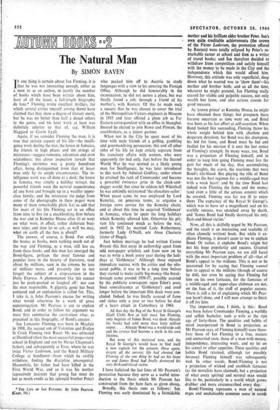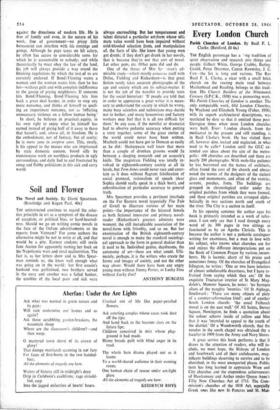The Natural Man
MUUMII [AOC 02
By SIMON RAVEN
IF one thing is certain about Ian Fleming, it is that he was not interesting enough, either as a man or as an author, to justify the number of books which have been written about him, least of all the latest, a full-length biography de luxe.* Fleming wrote excellent thrillers, for which several critics (myself among them) have claimed that they show a degree of literary merit, but he was no better than half a dozen others in the genre, and his later work at least was definitely inferior to that of, say, William Haggard or Gavin Lyall.
Again, if we consider Fleming the man, it is true that certain aspects of his life—the intelli- gence work during the war, the house in Jamaica, the friends in high places and the ,strings of mistresses—suggest romance, adventure and even wickedness; but closer inspection reveals that Fleming's existence was a pretty humdrum affair, being distinguished from that of lesser men only by its ample circumstances. The in- telligence work was all done at a desk; the house in Jamaica was simply a holiday retreat; the powerful friends were the natural acquaintance of one born and brought up in a wealthy upper- class family; and the mistresses (to judge from some of the photographs in these pages) were many of them remarkably plain. Let us add that for most of his life Fleming sat in an office from nine to five (in a stockbroking firm before the war and in Kemsley House after it) or went on what were, in effect, rather elaborate busi- ness trips; and then let us ask, as well we may, what on earth all the fuss is about?
The answer, of course, is Bond. For while the books, as books, were nothing much out of the way and Fleming, as a man, still less so, from these books and this man has emerged the Bond-figure, perhaps the most famous and popular hero in the history of literature, read about by millions, seen in the cinema by tens of millions more, and presently (let us not forget) the subject of a strip-cartoon in the Daily Express. A phenomenon like this cannot just be pooh-poohed or laughed off : nor can the man responsible. A gigantic genie has been conjured and an explanation is called for. This, I take it, is John Pearson's excuse for writing what would otherwise be a work of gross supererogation. Mr Pearson is out to explain Bond, and in order to follow his argument we must first summarise the curriculum vitae, as presented in this biography, of Bond's creator.
Ian Lancaster Fleming was born in Mayfair in 1908, the second son of Valentine and Evelyn St Croix Fleming (née Rose). He was educated at Durnford (then the most successful preparatory school in England and run by Hester Chapman's father), and subsequently at Eton, where he was twice Victor Ludorum, and the Royal Military College at Sandhurst—from which he swiftly withdrew, finding the discipline uncongenial. ,
Meanwhile, his father had been killed in the First World War, and so it was his mother (agressively insistent that young Ian must do her as much credit as his splendid brother Peter) * THE LIFE OF IAN FLF MING. By John Pearson. (Cape, 36s.) who packed him off to Austria to study languages with a view to his entering the Foreign Office. Although he did honourably in the examination, he did not secure a place, but was finally found a job, through a friend of his mother's, with Reuters. Of this he made such a success that he was chosen to cover the trial of the Metropolitan-Vickers engineers in Moscow in 1933 and later offered a plum job as Far Eastern correspondent with an office in Shanghai. Instead he elected to join Rowe and Pitman, the stockbrokers, as a junior partner.
When not in the City he spent most of his time with male friends of a golfing, gambling and gourmandising persuasion; this and all other sides of his life he kept strictly separate from his transitory affairs with women, who were apparently for bed only. Just before the Second World War he was spotted as a likely young man for Intelligence; he was later introduced to this work by Admiral Godfrey, under whom he attained the rank of Commander and became a powerful eminence grise in the cloak-and- dagger world; but since he seldom left Whitehall he was unkindly nicknamed `the chocolate sailor.' When peace came he was employed by Lord Kemsley, on generous terms, to organise a foreign news service for the Kemsley chain; and at about this time he acquired `Goldeneye' in Jamaica, where he spent the long holidays which Kemsley allowed him. Otherwise his xis; vate life continued much as before the war, until in 1952 he married Lady Rothermere; formerly Lady O'Neill, née Anne Charteris (sister of Hugo).
Just before marriage he had written Casino Royale (his first essay in authorship apart from odd newspaper articles), and from now on he was to write a book every year during the holi-' days at `Goldeneye.' Although these enjoyed immediate success with the critics and the edu- cated public, it was to be a long time before they started to make really big money (the break- through came around 1956-57, possibly assisted by the publicity consequent upon Eden's post‘ Suez convalescence at `Goldeneye') and eyed longer before the important film deals were con- cluded. Indeed, he was finally assured of fame and riches only a year or two before he died of a heart attack in Canterbury in 1964.
All that day the flag of the Royal St George's [Golf Club] flew at half mast. Ian Fleming, only begetter of James Bond, was dead. Already his books had sold more than forty million copies . . . Already Bond was a world-wide cult and his creator had become a myth in his own lifetime.
But none of this mattered now, and the Royal St George's would have to find itself a new captain for the autumn. Once again, despite all the success, life had cheated fah Fleming of the one thing he had set his heart on and James Bond had finally destroyed his only flesh-and-blood victim.
I have italicised the last lines of Mr PearSon's peroration because they serve as a useful intro- duction to the thesis which Mr Pearson has constructed from the bare facts as given above.
Broadly, this thesis runs as follows:. Ian, Fleming was early dominated by a frt-M.16We mother and his brilliant elder brother Peter. Ian's own quite creditable achievements (the crown of the Victor Ludorum, the promotion offered by Reuters) were totally eclipsed by Peter's re- markable career at school and then as a writer of travel books; and Ian therefore decided to withdraw from competition and satisfy himself with the money to be made in the City and the independence which this would afford him. However, this attitude was only superficial; deep down what he wanted was to 'show them'—his mother and brother both; and so all the time, whatever he might pretend, Ian Fleming really craved for visible and palpable success, not only wealth but fame, and also serious esteem for good measure.
As 'crown prince' at Kemsley House, he might have obtained these things; but prospects there became uncertain as time went on, and Bond was born as his last effort at self-assertion. When Bond looked like succeeding, Fleming threw his whole weight behind him with absolute and desperate devotion; for Bond was his champion, his bid for fame, and Bond must be fed and fuelled for his mission if it cost the last ounce of Fleming's strength. In many ways, too, Bond was a projection of Fleming himself, and in order to keep him going Fleming must live the part for much of the day, thus accumulating the thoughts, the esprit, the reactions that were Bond's life-blood. But playing the role of Bond was not the best regimen for a middle-aged man with a weak heart; and by the time Bond had indeed won Fleming the fame and the money (and even a little of the serious esteem) which he coveted, Fleming was far too ill to enjoy them. The captaincy of the Royal St George's, which was to have set a magnificent seal on his worldly success, was snatched away by death, and `James Bond had finally destroyed his only flesh-and-blood victim.'
Now, all this is skilfully urged by Mr Pearson, and the result is an interesting and readable (if often clumsily written) book. But while it ex- plains Fleming, it doesn't seem to me to explain Bond. Or rather, it explains Bond's origin but not his huge popularity and success. Granted everything Mr Pearson says, we are still faced with the most important problem of all—that of Bond's appeal to the millions. This is not to be accounted for by saying that Fleming wanted him to appeal to the millions (though of course he did), nor even by saying that Fleming fed him on his own fantasies, for the fantasies of a middle-aged and upper-class clubman are not, on the face of it, the stuff of popular success. There is still a lot of explaining which Mr Pear- son hasn't done, and I will now attempt to finish it off for him.
The important clue, I think, is this: Bond was born before Commander Fleming, a worldly and selfish bachelor, took a- wife at the ripe age of forty-three. The qualities and habits of mind incorporated in Bond (a projection, as Mr Pearson says, of Fleming himself) were there- fore those of Ian Fleming in a free, mature and unmarried state, those of a man with money, independence, interesting work, and no let on his sexual or other appetites. These qualities and habits Bond retained, although (or possibly
because) Fleming himself was subsequently
wed. In other words, Bond/Fleming is not a projection of wicked and snobbish fantasies (as the moralists have claimed), but a projection of what every spirited and normal man would like to be, particularly in a world which grows drabber and more circumscribed every day.
Bond/Fleming represents a man of natural urges and unshakeable common sense in revolt
against the dreariness of modern life. He is free of family and even, in the nature of his work, free of government—no prissy little bureaucrat can interfere with his comings and goings. Although he pays taxes on hi' t salary, he often has access to considerable sums for which he is accountable to nobody; and while theoretically he must obey the law of the land, his job will always provide a way round the finicking regulations by which the rest of us are currently enslaved. If Bond/Fleming wants a woman and the woman wants him, then he has her—without guilt and with complete indifference to the gossip of prying neighbours. If someone hits Bond/Fleming, Bond/Fleming hits him back a great deal harder, in order to stop any more nonsense, and thinks of himself 'as quell- ing an impertinent nuisance, not as 'inflicting unnecessary violence on a fellow hurban being.'
In short, he believes in practicalhequity, in his own right to enjoy what he, himself has earned instead of giving half of it away to those that haven't, and, above all, in freedom. He is the embodiment, not of fantasy, but of sanity; he is mens sana in corpore sano. This, surely, is his appeal to the masses who are imprisoned by stale domestic custom, bored silly by monotonous work on worthless products in ugly surroundings, and daily lied to and frustrated by smug and flabby politicians in this sick and sorry world.







































 Previous page
Previous page